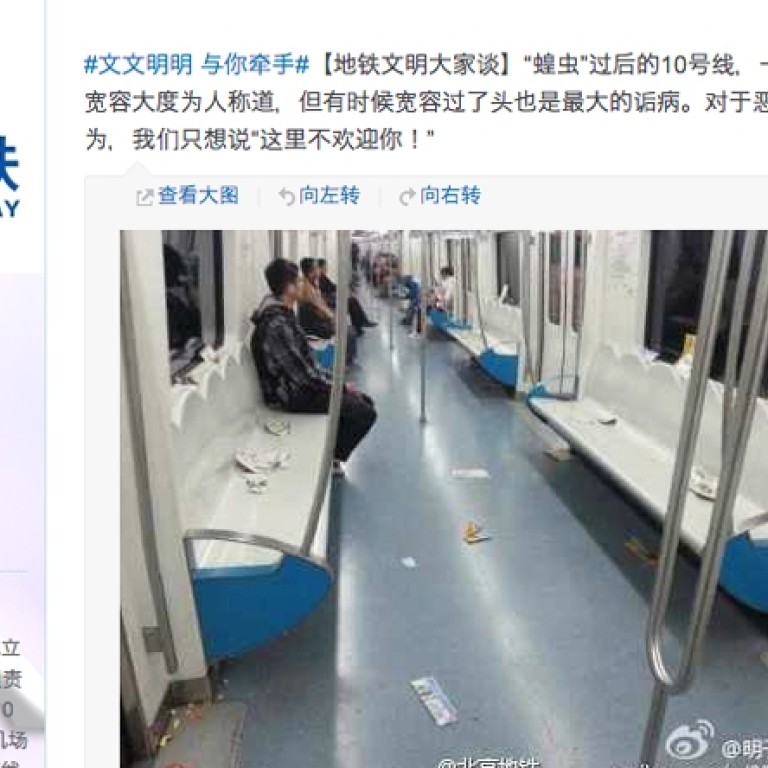
Beijing subway provokes outrage with offensive post on 'locust' passengers
The Beijing subway’s official Sina Weibo account has used the word “locust,” a pejorative term used by some Hongkongers to describe hordes of mainland tourists, in reference to passengers on the underground.
“After a ‘locust’ invasion, line 10 is a mess,” it posted on Sunday morning just after 11am. “The capital city has always been applauded for its high tolerance, but sometimes, being too accepting is the biggest problem. Regarding behaviour that damages Beijing, we just want to say: ‘you are not welcome here!’”
The posting was accompanied by a picture showing a nearly empty carriage littered with flyers, newspapers, snacks and other rubbish.
So far, the original post has generated more than 6,000 comments and almost 6,000 retweets. Many netizens were furious about the insulting language indicating discrimination against non-locals.
“People living in big cities are so clever. With just a glimpse, they can tell all the litter is from non-locals,” a commentator sarcastically noted.
“Calling people ‘locusts’ on an official account, are you kidding me?” wrote another commentator.
The person who originally took the photo, who is from Beijing, explained to the that he posted the photo on weibo because he couldn’t stand so many people giving away flyers in the subway.
“I just wanted to say it was very messy in the carriage, which has nothing to do with [the issue of] locals or non-locals,” this Beijinger claimed, adding that he didn’t know his photo had been used by the ‘Beijing Subway’ account.
Sherry Wang Xuan, 22, commutes on subway line 10 at least three times a week. She argued that the sanitary condition of the line was worse than any other lines and that there was constant overcrowding.
“There are always so many people giving away real estate flyers on line 10, and passengers leave them in the carriage when they get off,” said Wang. “But regarding the name-calling, it’s so vague - are they calling the non-locals “locusts”, or the leafleteers?”
According to the , the subway operation company explained that the post had been written by an inexperienced young editor. It had been meant to raise awareness and condemn uncivil behaviour on the subway, it reported the company as saying, but the controversial wording had led to the company being the target of disdain.
The original post was hidden from the weibo timeline from 4pm on Sunday, until this morning when it was completely deleted.
The published an editorial today on its website criticising the insulting language and further pointed out that it was not just a problem about someone having a “dirty mouth”.
“The Beijing subway doesn’t represent the city, but it is a public service like a window of Beijing. Compared to the picture in the post, the problematic service the subway system provides is much worse than the littered carriages,” the editorial said.
In November 2011, the Beijing government launched a “Beijing spirit” campaign consisting of four words, with “lenient” ranked third. Many netizens satirised the post as being the best representation of the “Beijing spirit”.
Line 10 is the second loop line in the Beijing subway system operating between the city’s third and fourth ring roads, with a total length of 57.1 kilometres, making it the world’s longest subway loop line. 45 stations connect three districts including Haidian, Chaoyang, and Fengtai. It has been fully operational since May this year and is the busiest subway line in Beijing.
41-year-old migrant worker Pan Denghua spends about 40 minutes daily on line 10 commuting work. To him, “crowded” is always the word associated with line 10.
“China is a big country. There is always a big education gap between the farmers and city dwellers. Especially now after the autumn harvest, when many rural residents come to the cities to make some extra money,” said Pan.
“We need more time to become accepting and it is always a long process to become more civilized.”
